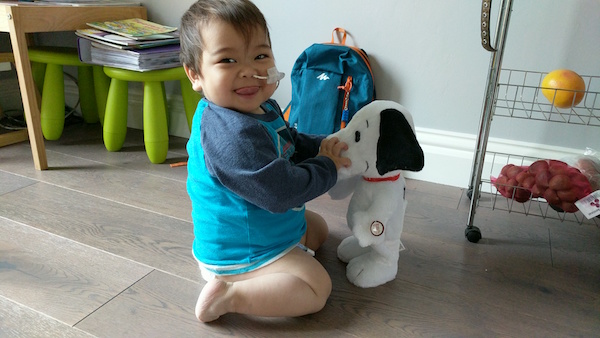Ally Kim is two years old, lives in London and loves football, blowing bubbles, giving kisses and playing with his older brother Micah and his dog Chocopie.
And Ally is fighting against time. Because Ally is sick — he’s got an extremely rare illness, called chronic granulomatous disease (CGD), that prevents his immune system from killing certain bacteria and fungi, which in turn cause infections.
Without treatment, every infection — and they happen too frequently for comfort — could prove fatal. Ally’s only hope for gaining full recovery is a bone marrow transplant match, and his parents are hoping that, by spreading the word about their little boy, someone will emerge.
They’re not the only ones, either. Influencers like J.K. Rowling, Daniel Dae Kim and South Korean soccer hero Son Heung-min have also thrown in their voices in support of Ally, as have organizations and churches across the globe, including Asians for Miracle Marrow Matches (A3M) in Southern California, which have put on localized registry drives.

Ally Kim, 2, suffers from a rare condition called CGD. (Courtesy of Andrew Kim)
Each is reminding those listening that all it takes to determine whether they can save Ally, and thousands of others who share his situation, is one cheek swab with a Q-tip. Just as important, they’re hoping to reach East Asian donors, from whom Ally, who is of Korean descent, is most likely to find a match.
It’s proven to be a difficult task. According to Be The Match, there’s a 72 percent likelihood that an Asian patient will match with another Asian of close ethnic background, as matches are determined by inherited genetic markers; but the latest numbers show that the national registry is made up of just 7 percent donors of Asian Pacific background (whites make up 73 percent of the registry, while Latinos make up 9 percent and blacks 8 percent.)
Andrew, Ally’s father, is a medical research engineer. He and his wife Judy are Korean Americans who moved to the U.K. less than a decade ago. Upon learning of Ally’s diagnosis, Judy took a leave from her job as a scientist and Oxford University lecturer to take care of her son at the hospital full-time.
“For Judy, it’s a living hell,” Andrew said. They watched as their son endured multiple infections and abscesses to his liver. “She’s seen him crying, suffering, all day long. It’s been a lot of challenges for us.”
After staying for months at the Great Ormond Street Hospital for children in London, Ally was able to return home with his family. As of April, he’s now back in the hospital as patient No. 4 in an experimental gene therapy, which has seen initial success in its first patient over a one-year post-gene therapy period.
“To see how [Ally] was — laying around in a hospital bed, doctors poking at him, has been really stressful,” Andrew said. “Judy and I are grateful that we’re even able to do the treatment.”
Still, the reality is that, while a successful therapy would give Ally enough functionality to go to school and join other kids in doing what kids do, his only chance of full recovery remains a bone marrow transplant.
“Nobody wants to see their son suffer like that,” Andrew said. “He’s so young. He’s only 2.”
“[Ally’s] immune system is compromised, and the only cure is a complete bone marrow match — not a half-match, a full one,” said Julie Im, Korean outreach and recruitment coordinator at A3M, a Be The Match recruitment center. “Only a 10/10 perfect match will work for a bone marrow operation.”
Im said her organization has been working with Ally’s parents to put together drives and get the word out about his story. It’s hosted more than 15 drives, of some 110 total across the rest of the country, the U.K., South Korea and Canada. Andrew said his son’s story had stirred an estimated 4,500 to sign up for the registry.
“Ally’s story moves people’s hearts,” Im said. “He’s been diagnosed since he was 1. He couldn’t talk yet, or express his pain in a verbal way. People hear that and are willing to help, to get curious about the process.”
Ally’s story, which has been shared via the hashtag #allysfight on social media, was first picked up and shared by “Harry Potter” author J.K. Rowling, who on her Twitter account encouraged her millions of followers to help find a donor.

Ally Kim (Courtesy of Andrew Kim)
Kim, the Korean American actor and filmmaker whose credits include “Lost” and “Hawaii Five-0,” has taken to both his Twitter and Instagram to talk about Ally’s fight. “This beautiful little boy in England desperately needs a bone marrow transplant,” Kim wrote. “To all my friends and fans who are of Asian descent, please take a moment to register to join the bone marrow database so that he can leave the hospital where (he’s) lived every day since he was only one year old.”
The cheek swab, which is tested for markers, requires initial testing to assess whether donors — only 8 percent of whom go on to actually donate bone marrow — are close enough a match to needy patients. The registry, according to Im, suffers from negative misconceptions among the public about stem cell donation, in particular the pain and recovery time that is associated with the process.
Not all donations require surgery, and donors typically go home the same day, according to A3M. One to 5 percent of a donor’s marrow is required to save a life, and marrow replaces itself in 4 to 6 weeks. No part of the bone — only the liquid marrow inside the pelvic bone — is removed.
“There are a lot of success stories,” Andrew said. “It gives us a lot of hope.”
Visit Be The Match for more information on registering for the database in your area, and keep up with Ally through his Facebook and website.







